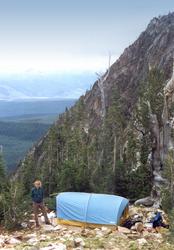
at her field area,
Sawtooth Mountains, Idaho
American Geological Insitute
United States Geological Survey
Keynote Lecture - Rock Stars: The Earthly View
by
Professor Barb Dutrow
Department of Geology & Geophysics
Louisiana State University
 |
Geology is the study of our Planet - Earth. Remarkably varied in their scope, geologists study topics ranging from the materials that compose our Planet (minerals) to the chemical and biological processes that shape its surface. Our Earth is constantly changing, being in motion, from the core to the outer surface . Formed 4.5 billion years ago, the Earth produces most of the resources (such as water and metals) that make our life and its technology as advanced as it is. Earth materials have been used since the dawn of modern humans. Prehistoric humans used two minerals to first make fire: flint and pyrite. Geologists now search for many more resources, such as oil, gas, coal, and water the world over , including the mid-west; help protect these precious commodities and help plan their future use. In turn, geologists strive to maintain a quality environment. Many geologists are involved in various governmental activities. Some geologists study prehistoric life such as mammoths and bison that tell us about earlier environments or micro-organisms that tell us about climate change recorded in the oceans. Geologists also help protect the public from natural disasters by studying earthquakes, volcanoes, landslides, floods, and other natural hazards, to understand when and where they occur. Some geologists escape our planet to study other planets and extraterrestrial bodies, such as meteors and asteroids. Exciting careers abound in the earth sciences, from teaching to research to planetary exploration to governmental policy making. |
| Professor Barb Dutrow
at her field area, Sawtooth Mountains, Idaho |
Learn more about careers in the earth sciences and geology at these
websites:
American Geological Insitute United States Geological Survey |